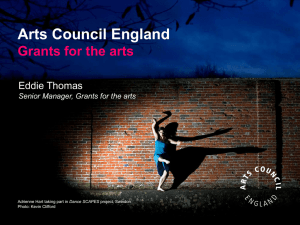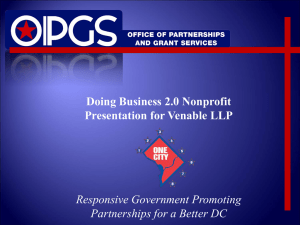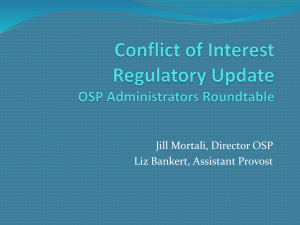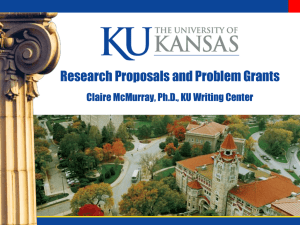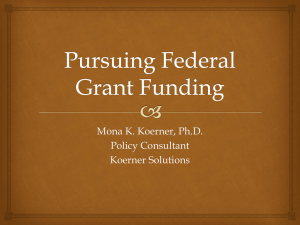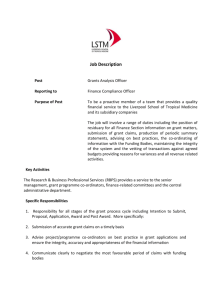The American Foundation for Suicide Prevention provides research
advertisement
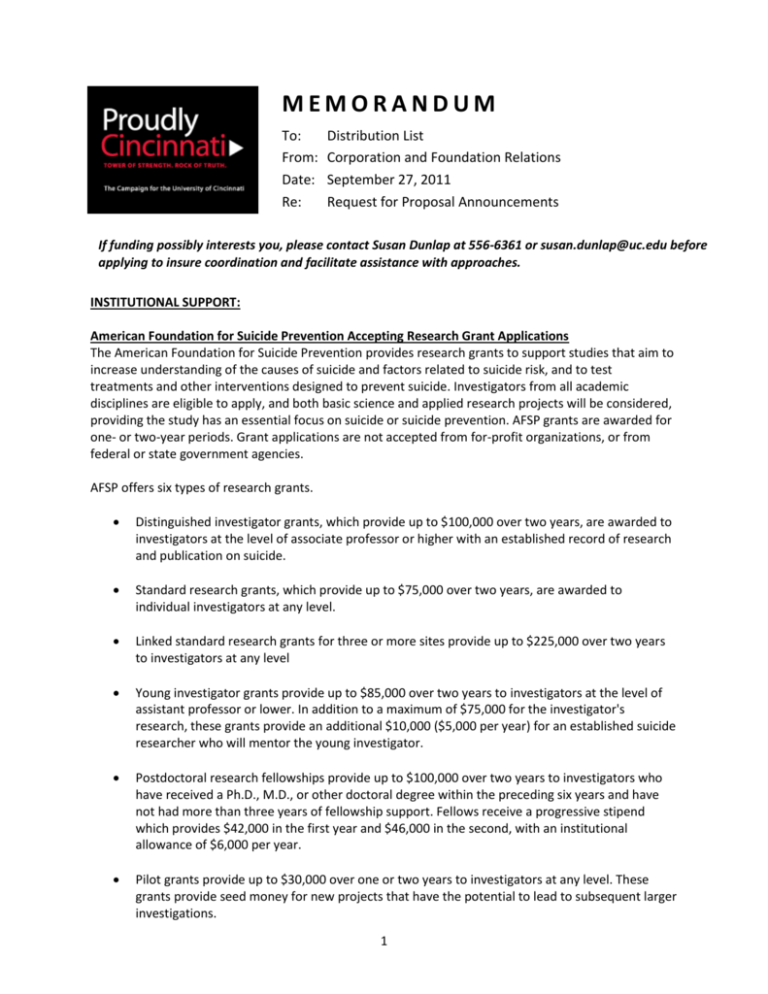
MEMORANDUM To: From: Date: Re: Distribution List Corporation and Foundation Relations September 27, 2011 Request for Proposal Announcements If funding possibly interests you, please contact Susan Dunlap at 556-6361 or susan.dunlap@uc.edu before applying to insure coordination and facilitate assistance with approaches. INSTITUTIONAL SUPPORT: American Foundation for Suicide Prevention Accepting Research Grant Applications The American Foundation for Suicide Prevention provides research grants to support studies that aim to increase understanding of the causes of suicide and factors related to suicide risk, and to test treatments and other interventions designed to prevent suicide. Investigators from all academic disciplines are eligible to apply, and both basic science and applied research projects will be considered, providing the study has an essential focus on suicide or suicide prevention. AFSP grants are awarded for one- or two-year periods. Grant applications are not accepted from for-profit organizations, or from federal or state government agencies. AFSP offers six types of research grants. Distinguished investigator grants, which provide up to $100,000 over two years, are awarded to investigators at the level of associate professor or higher with an established record of research and publication on suicide. Standard research grants, which provide up to $75,000 over two years, are awarded to individual investigators at any level. Linked standard research grants for three or more sites provide up to $225,000 over two years to investigators at any level Young investigator grants provide up to $85,000 over two years to investigators at the level of assistant professor or lower. In addition to a maximum of $75,000 for the investigator's research, these grants provide an additional $10,000 ($5,000 per year) for an established suicide researcher who will mentor the young investigator. Postdoctoral research fellowships provide up to $100,000 over two years to investigators who have received a Ph.D., M.D., or other doctoral degree within the preceding six years and have not had more than three years of fellowship support. Fellows receive a progressive stipend which provides $42,000 in the first year and $46,000 in the second, with an institutional allowance of $6,000 per year. Pilot grants provide up to $30,000 over one or two years to investigators at any level. These grants provide seed money for new projects that have the potential to lead to subsequent larger investigations. 1 AFSP does not set a quota for the number of grants in each category that will be funded in a particular cycle. Rather, grants are selected for funding based on their individual merit. AFSP grants and fellowships can be awarded to applicants at institutions outside the U.S., as well as to international applicants who are working at U.S. institutions, providing they meet the general eligibility requirements for the relevant grant category.Visit the AFSP Web site for complete program guidelines and application materials. Deadline: November 15, 2011 http://www.afsp.org/index.cfm?fuseaction=home.viewPage&page_ID=0535FDA2-FA7D-AAE8D7A9A6BCFFE3574B Melanoma Research Alliance Seeks Innovative Proposals to Address Gap in Translational Science The Melanoma Research Alliance is a public charity that supports an international cross-disciplinary group of biomedical researchers with the clinical and scientific expertise to explore, identify, and pursue innovative solutions to critical research questions leading to better treatments and a cure for melanoma patients. The MRA is soliciting proposals that address the gap in translational science- —, i.e., turning scientific discoveries into tools and/or treatments for high risk individuals or melanoma patients. Successful proposals will have potential for translational development that could lead to high-impact near-term clinical application in areas of melanoma prevention, diagnosis, staging, and treatment. Development and/or use of novel technologies that have the potential to further such advances in the program's areas of emphasis will be considered. For the 2011-12 cycle, proposals in the following areas are of particular interest and will receive special consideration: developing combinatorial treatment strategies for patients with unresectable stage III-IV melanoma; exploring biomarkers of treatment response and/or resistance mechanisms to immunotherapy and developing methods to overcome resistance; characterizing molecular pathways driving BRAF wild type melanomas; and defining unique molecular and/or immunological characteristics of acral and amelanotic melanomas in order to identify new therapeutic targets in these patients. MRA plans to provide at least $3 million in new funding for Individual Investigator Awards during the 2011-12 cycle. Proposals will be accepted for Individual Investigator Awards in the following categories: Young Investigator Awards provide investigators within four years of their first academic faculty appointment with $75,000 per year for two to three years to accomplish innovative, early concept projects. Established Investigator Awards provide investigators with an established record of scientific productivity with up to $125,000 per year for two to three years to conduct projects supported by preliminary data. Pilot Awards provide an award of $50,000 per year for two years for potentially transformative pilot studies from investigators who are past the initial four years of their first academic faculty appointment. Academic-Industry Partnerships awards are designed to facilitate interactions between the academic and industrial research sectors, and will be co-funded by MRA and an industrial collaborator whose involvement is essential to the project. The PI must be an academic investigator. Industry scientists may serve as co-investigators or collaborators. Investigators with an established record of scientific productivity will receive up to $100,000 per year for two to three years from MRA to conduct projects supported by preliminary data. Industry funds or in-kind support must match but may exceed MRA funds for two to three years, for a total annual award value of $200,000 or more. 2 Principal investigators must hold a faculty appointment at an academic research institution within or outside the U.S. at the level of assistant professor (or equivalent) or above. Investigators need not be specifically trained in melanoma research; however, they should be working in an environment capable of conducting high-quality, high-impact melanoma research. Visit the MRA Web site for complete program guidelines, application procedures, and information on previously funded research. Deadline: December 1, 2011 http://www.curemelanoma.org/research/research.taf?cat=rfp Robert Wood Johnson Foundation Invites Brief Proposals for Evaluation Innovations in Nursing Education Program The Robert Wood Johnson Foundation's Evaluating Innovations in Nursing Education program is inviting applications for research projects that study nursing faculty issues which are critical to achieving the recommendations outlined in the 2010 Institute of Medicine report The Future of Nursing: Leading Change, Advancing Health. Consistent with EIN's mission, projects typically will address teaching productivity and faculty preparation in nursing education for meeting the demands of a reformed healthcare and public health system. Findings should inform strategies for addressing the nurse faculty shortage while expanding the nurse workforce and maintaining or improving student outcomes. The program welcomes applications that draw on the expertise of researchers from nursing and other health sciences, the social sciences, and other relevant disciplines. Eligible applicant organizations include academic institutions, healthcare organizations, and research firms. Preference will be given to applicants that are either public entities or nonprofit 501(c)(3) organizations. Researchers working on the proposed project must be citizens or permanent residents of the U.S. or its territories. A total of up to $1.8 million in grants will be awarded in this round of funding. Grants of up to $100,000 might support case studies, scans of existing programs, or determinants of best practices. Grants of up to $300,000 might support survey research or controlled evaluations. All grants will be twenty-four months in duration or shorter. The program will hold an optional applicant webinar on October 6, 2011. Registration is required. The complete Call for Proposals, application materials, and applicant Webinar details are available at the RWJF Web site. Deadline: November 16, 2011 http://www.rwjf.org/applications/solicited/cfp.jsp?ID=21375 INDIVIDUAL SUPPORT: Center on Theological Inquiry and Templeton Foundation Offers Research Fellowships for Inquiry on Evolution and Human Nature The Center of Theological Inquiry is an independent research institution in Princeton, New Jersey, with a visiting scholar program. With support from the John Templeton Foundation, the center is convening an interdisciplinary team of theologians and scientists to address questions of nature and nurture raised by 3 the biological evolution of human beings. The program is inviting qualified scholars to apply to join this research team on evolution and human nature. The program welcomes proposals to explore how new research in evolutionary biology, psychology, and anthropology is challenging and changing the understanding of human nature and development, not least in relation to religion and theological accounts of the human condition. The program's field of inquiry encompasses these evolutionary and human sciences, theological anthropology, practical theology, psychology of religion, religious studies, and the history and philosophy of science. Applications will be considered from scholars in relevant disciplines generating ideas with a global impact on the topic, including the core questions of nature and nurture and the relationship between religion, culture, and human evolution. Successful applicants will be awarded one of eight research fellowships of up to $70,000 or one of two postdoctoral fellowships of up to $40,000 to enable them to be in residence at the center during its academic year from September 1, 2012 to May 31, 2013. Research fellows will also be eligible for a publication award of $12,000 upon successful completion of the publication plan set out in their research proposal. Applicants for the research fellowships should be in full-time tenured or tenuretrack positions at an accredited higher education institution. Applicants for postdoctoral fellowships should have successfully completed all requirements for the Ph.D. by the date of application. For complete program information and application procedures, visit the Center on Theological Inquiry Web site. Deadline: November 30, 2011 http://www.rwjf.org/applications/solicited/cfp.jsp?ID=21374 Robert Wood Johnson Foundation Announces Call for Applications for 2012-13 Health Policy Fellows The Robert Wood Johnson Foundation Health Policy Fellows program is designed to provide a comprehensive fellowship experience at the nexus of health science, policy, and politics in Washington, D.C. The year-long program provides an opportunity for exceptional midcareer health professionals and behavioral and social scientists with an interest in health and healthcare policy. Fellows participate in the policy process at the federal level and use that leadership experience to improve health, healthcare, and health policy. Up to six grants of up to $165,000 each will be made in 2012. Each fellow will receive up to $94,000 for the Washington stay (September 1, 2012, through August 31, 2013) in salary, plus fringe benefits or fellowship stipend. Continued pre–approved leadership development activities may be conducted with any remaining funds within twelve months following the Washington year. Fellows will receive an additional allowance for relocation.Exceptional candidates from academic faculties and nonprofit healthcare organizations are encouraged to apply. Applicants may have backgrounds in the allied health professions, biomedical sciences, dentistry, economics or other social sciences, health services organization and administration, medicine, nursing, public health, social and behavioral health, or health law. Applicants must be U.S. citizens, resident noncitizen nationals, or resident foreign nationals. The deadline for online applications is November 9, 2011. (Please note that reference letters must be submitted online by November 2, 2011.) Complete program information, selection criteria, and application instructions are available at the RWJF Web site. Deadline: November 9, 2011 4 http://www.rwjf.org/applications/solicited/cfp.jsp?ID=21374 Burroughs Wellcome Fund Accepting Applications for Collaborative Research Travel Grants The Burroughs Wellcome Fund's Collaborative Research Travel Grants program provides up to $15,000 in support for Ph.D. candidates, postdoctoral fellows, and faculty researchers from degree-granting institutions in the U.S. or Canada to travel either domestically or internationally to a laboratory to acquire a new research technique, to facilitate a collaboration, or to attend a laboratory/lecture course. Applicants must hold a Ph.D. or be studying for a Ph.D. in mathematics, physics, chemistry, computer science, statistics, or engineering and be interested in investigating research opportunities in the biological sciences. Biologists interested in working with physical scientists, mathematicians, engineers, chemists, statisticians, or computer scientists to incorporate their ideas and approaches to answering biological questions are also eligible to apply. Applicants must be citizens or permanent residents of the U.S. or Canada at the time of application. Grants cannot be used for travel to domestic or international meetings or to cover salary support. Awards will be made to North American degree-granting institutions on behalf of the named award recipients. Visit the BWF Web site for complete program guidelines, FAQs, eligibility quiz, and the application Deadline: December 1, 2011 http://www.bwfund.org/pages/481/Collaborative-Research-Travel-Grants/ AWARDS: Nomination Period Open for Kavli Prizes in Astrophysics, Nanoscience, and Neuroscience The Kavli Prizes are designed to recognize scientists whose discoveries have dramatically expanded human understanding in the fields of astrophysics, nanoscience, and neuroscience. Consisting of a scroll, medal, and cash award of $1 million, a prize in each of these areas has been awarded biennially since 2008. The prizes represent a partnership of the Norwegian Academy of Science and Letters, the Kavli Foundation, and the Norwegian Ministry of Education and Research. The Kavli Prize in Astrophysics is awarded for outstanding achievement in advancing the knowledge and understanding of the origin, evolution, and properties of the universe, and includes the fields of cosmology, astrophysics, astronomy, planetary science, solar physics, space science, astrobiology, astronomical and astrophysical instrumentation, and particle astrophysics. The Kavli Prize in Nanoscience is awarded for outstanding achievement in the science and application of the unique physical, chemical, and biological properties of atomic, molecular, macromolecular, and cellular structures and systems manifested in the nanometer scale. This includes molecular selfassembly, nanomaterials, nanoscale instrumentation, nanobiotechnology, macromolecular synthesis, molecular mechanics, and related topics. The Kavli Prize in Neuroscience is awarded for outstanding achievement in advancing the knowledge and understanding of the brain and nervous system, including molecular neuroscience, cellular neuroscience, systems neuroscience, neurogenetics, developmental neuroscience, cognitive neuroscience, computational neuroscience, and related facets of the brain and nervous system. 5 The nomination process is open to all who wish to nominate candidates, but self-nominations will not be accepted. The prize can be awarded to a single person for profound scientific achievements or shared for closely related fundamental contributions. Deceased persons cannot be nominated. For complete program information, the nomination form, and information on previous prize winners, visit the Kavli Foundation Web site. Deadline: December 1, 2011 http://www.kavliprize.no/ **PLEASE NOTE: RFPs for public funds are distributed by the Office of Research** 6


